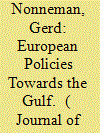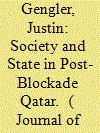| Srl | Item |
| 1 |
ID:
178585


|
|
|
|
|
| Summary/Abstract |
This paper discusses European policies towards the Qatar crisis in the context of the evolution of broader past and present European policies towards the Gulf. It starts with a summary discussion of historical patterns of relations between Europe and the Gulf, before briefly sketching the major changes in the regional environment after the Second World War, beginning with the US supplanting the UK as the dominant hegemon, through to the changes wrought by Trump’s elevation to the US presidency. It then turns to a discussion of the effects of these changes for the Gulf and other regional states and their policy postures, before going on to examine the ways in which European states and the EU have interpreted and reacted to this changing environment. These reactions are often at one and the same time a reaction to the changes and uncertainties in US policy under Trump, since this changing US role is also a crucial ingredient both in the region and for Europe’s room for manoeuvre. Against this background, the paper will outline European policies towards the Gulf theater in particular, focusing on Iran and the JCPOA nuclear deal, and the GCC (or Qatar) crisis –– while also briefly considering the Yemen crisis and the impact of Gulf competition on and in the Libyan theater. From October 2018, the Khashoggi affair added an additional dimension to the crisis, as did the renewed oil price crash amidst the global COVID-19 pandemic beginning in 2020.
|
|
|
|
|
|
|
|
|
|
|
|
|
|
|
|
| 2 |
ID:
178581


|
|
|
| 3 |
ID:
178584


|
|
|
|
|
| Summary/Abstract |
How are nationalism and national identity shifting in Qatar as a result of the regional crisis? This study explores whether this moment of geopolitical fluidity allows for changes in sociocultural behavior and norms among Qatari citizens. Specifically, this research uses the case study of the newly opened National Museum of Qatar to examine a state-crafted narrative of national identity and society’s response to this narrative. Our original fieldwork highlights the museum’s combination of desert and sea lifestyles to create a “unity” narrative of Qatari national identity, and explores the mixed reactions of citizens who feel varying levels of representation and inclusion in this narrative. This study concludes with a critical analysis of the malleability of national identity during times of political upheaval.
|
|
|
|
|
|
|
|
|
|
|
|
|
|
|
|
| 4 |
ID:
178582


|
|
|
|
|
| Summary/Abstract |
Ontological security speaks to a kind of identitarian security and argues that actors need to have a surety and certainty in who and what they are in order to enjoy settled peaceable lives. As a furrow of international relations theory, it argues that states must attend to ontological security needs just as they are concerned about physical security needs. Applied to the Gulf context, analysis of ontological security concerns provides a set of coherent rationales explaining why ontological security pressures play in an exaggerated way on the United Arab Emirates and why, in this context, Qatar is a uniquely problematic Other. As such, uncovering these deeper, abstract security drivers provides a compelling explanation to explain the bitterness and animosity inherent to the UAE’s surprising decision to lead the 2017 blockade against Qatar.
|
|
|
|
|
|
|
|
|
|
|
|
|
|
|
|
| 5 |
ID:
178586


|
|
|
|
|
| Summary/Abstract |
This article assesses how the decisions taken in and after 2011 in Doha, Abu Dhabi, and Riyadh strained and shattered the lingering consensus and common threat perception that had, since 1981, provided a baseline for regional cooperation within the Gulf Cooperation Council (GCC). It explores how the rifts after 2011 have hit on weak-points within the GCC in ways that complicate any potential recoherence or “coming-back-together” in anything close to the pre-2017 form. This occurred as the pragmatic flexibility within the GCC was eroded by a “zero-sum” mentality that has split GCC states along multiple lines rather than just a “clean” break over a specific issue. While the relationship between Riyadh and Abu Dhabi has become a new and exclusionary center of gravity in Arab Gulf politics, the article ends by examining the prospects for regional order against the backdrop of a fractured GCC and the prospects for greater balance as the disengagement of US interest accelerates the internationalization of the political economy and international relations of Persian Gulf states.
|
|
|
|
|
|
|
|
|
|
|
|
|
|
|
|
| 6 |
ID:
178583


|
|
|
|
|
| Summary/Abstract |
This article examines key questions of citizen-state, citizen-citizen, and citizen-expatriate relations in the Arab Gulf states through the lens of the 2017 Qatar blockade. It utilizes original public opinion survey data that allow examination of the embargo’s short-term impacts on social and political relations in Qatar as well as broader trends observed over the period from 2010 to 2019. Results lend support to some existing qualitative accounts suggesting changes in important social and political dynamics in Qatar after the blockade. However, survey data also show that such post-blockade differences are mostly reflections of larger attitudinal shifts witnessed over the course of the past decade, rather than isolated effects of the GCC crisis. This suggests the possibility that other Gulf Arab states are experiencing similar transformations in popular sociopolitical orientations and behavior brought on by the same long-term drivers.
|
|
|
|
|
|
|
|
|
|
|
|
|
|
|
|